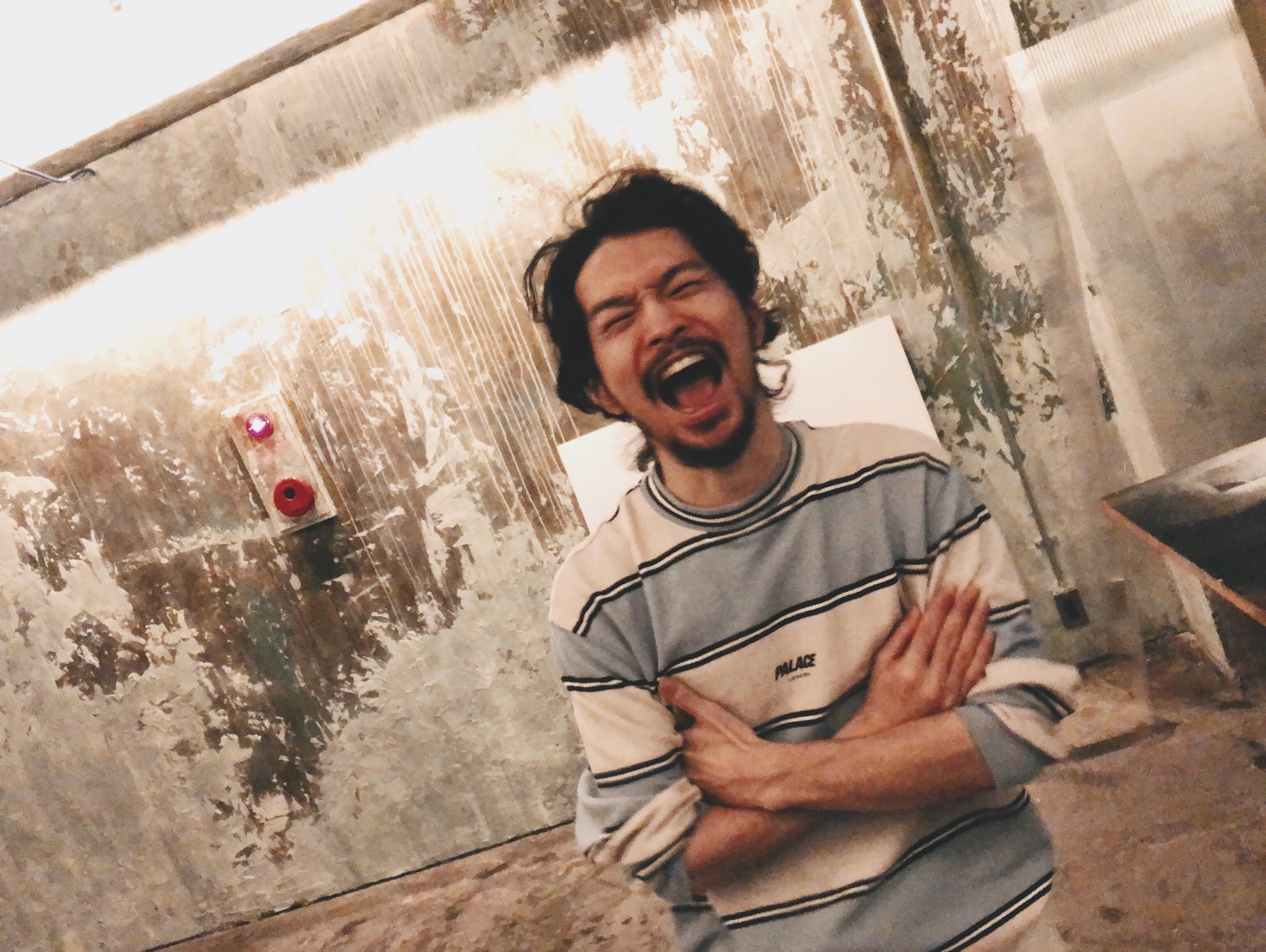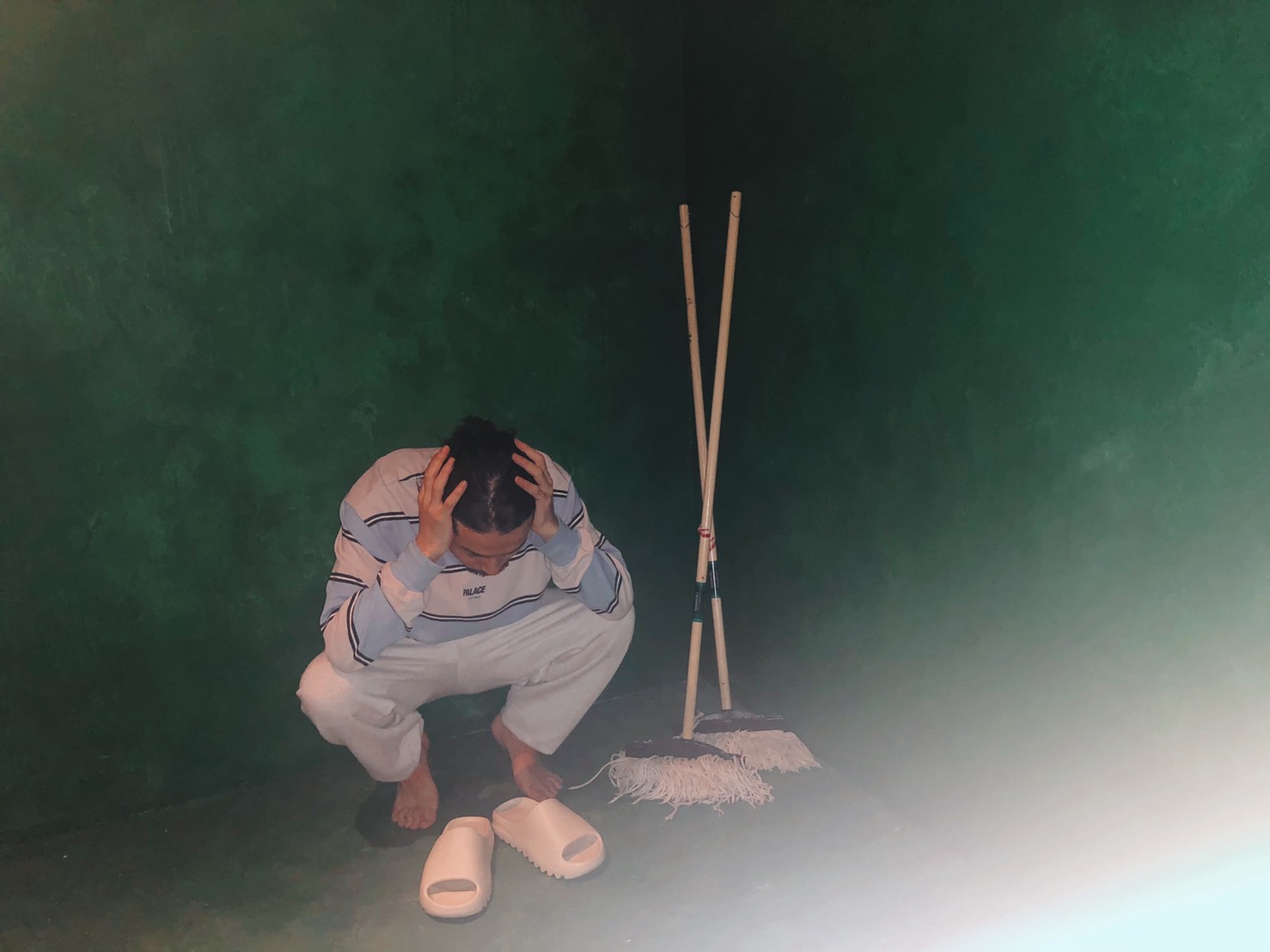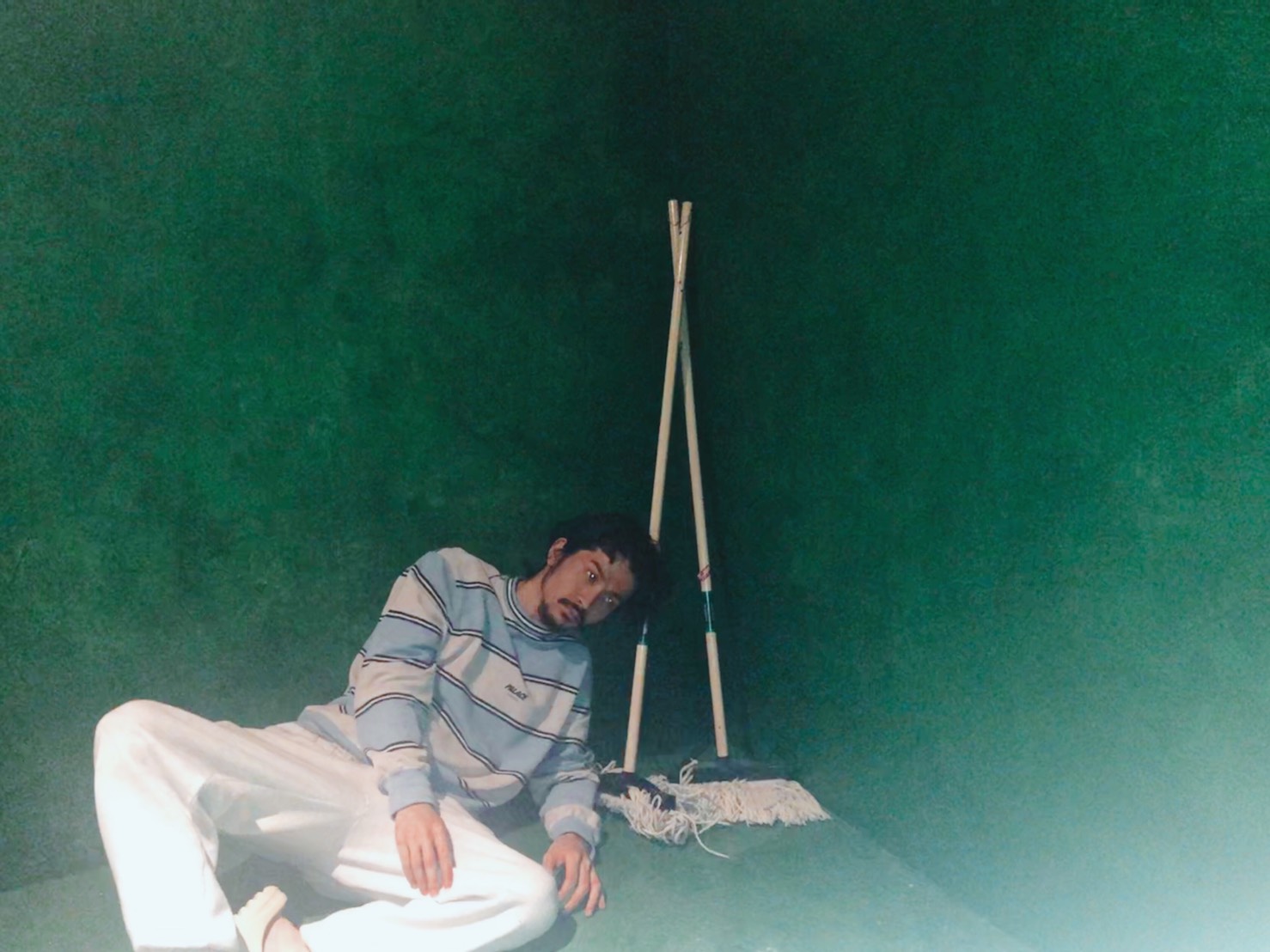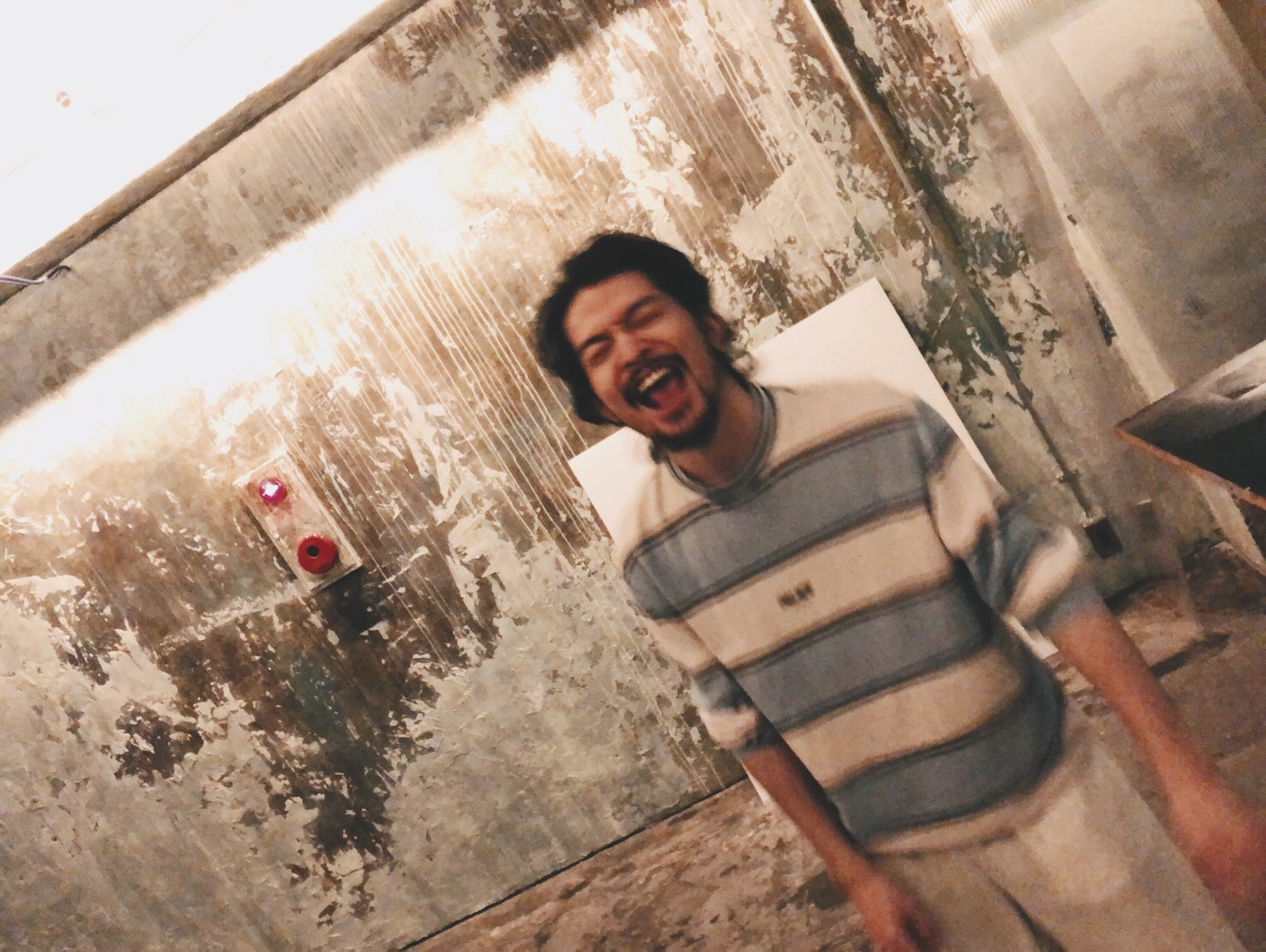millennium parade is the new project launched by Daiki Tsuneta of King Gnu fame, based around the concept of “Hyakki Yagyo” [‘Night Parade of One Hundred Demons’, an idiom in Japanese folklore referring to an uncontrolled horde of supernatural creatures], uniting various cultural influences under the theme ‘Tokyo Chaotic’ Below, the in-demand Tsuneta tells i-D how his collective got the chance to create the theme song for the latest series in what is considered by many to be the gold standard of sci-fi anime, Ghost in the Shell: SAC_2045, as well as his new-found vision and desires for the world.

I felt that the lyrics and worldview presented in the music video for “Fly with me” were alluding to a deeper message towards society and those that hold great power. What were the underlying thoughts behind the creation of this song?
It’s not that I wanted to make a critical social commentary with this song. We, the band members and the creative team, are not from Tokyo, for the most part. And so, I wanted to express the feeling of the moment you first head out to go to Tokyo [before]. Now, I’m more focused on lyrics and sounds that connect with my desire to go abroad from Japan. I thought that this theme would resonate with people from any country or race. It’s not that I was trying to criticize anything in particular, but I feel that as we go out [of our comfort zones], we will inevitably come up against a wall or be at the mercy of the whims of those with greater power.
What is behind your mindset of wanting to go abroad?
With the development of the internet meaning music from anywhere around the world can reach you without any lag, the need to be bound by values specific to the music industry in Japan is quickly disappearing. This is something that I’ve always thought about, so it was only natural for me.
In that sense, we could even say that “Fly with me” is you and your crew’s own personal theme song.
This song was originally born from the idea of making a theme song for ourselves. But I also spoke with the director about how I think it connects to “Public Security Section 9”, of which the protagonists of the show are members of.
Have you watched any of the other works from the Ghost in the Shell series?
Yes,the series is one that has been often talked about and referenced since the inception of our creative team (PERIMETRON).
What do you personally like about the series?
I love the story telling, obviously, but the art style is my favorite aspect. Those visuals that make you go “Asia is so cool”. That aesthetic style of a futuristic, somewhat deformed metropolis, Ghost in the Shell-style, made me think about how Tokyo, where I live, could be seen through that lens.
The fact that you are a band from Tokyo is a central theme for you, and it seems that there are many other elements that sync well with the visuals from the show. Where you happy when they asked you to produce the theme song? (laughs)
I was thinking I would do whatever it takes to clear my schedule for it, and I was absolutely determined to make it happen. (laughs)
What did the Ghost in the Shell team originally request for the theme song?
I had already been conceptualizing “Fly with me” before the offer came. I wrote some other songs with Ghost in the Shell in mind. But the director requested that the song sound current, and so I made a conscious decision not to be too influenced by the sound of the series up to now. Especially because the offer we received gave us a lot of freedom, and they wanted us to inject our worldview and the values of our generation.
The Ghost in the Shell team seems very open to new ideas despite how beloved the series is… Sounds like a great opportunity.
I think the series itself probably came out of and has always operated with that mindset. I thought they had a really great team.
You mentioned earlier that millennium parade’s focus is to go global, while on the other hand, King Gnu’s focus as a band seems to be on being the best in Japan. Are you purposefully keeping a separation between the two identities?
Japan has a huge music market, and I personally love Kayōkyoku (Japanese pop standards/Showa-era pop; a precursor to modern J-pop). I like to think that King Gnu is a band that shows a deep respect for the history of pop music in Japan. millennium parade represents a respect for art in a much broader sense, and in its form of expression has a much broader multi-disciplinary aspect, rather than just being a music project. So I think that the scope is a bit different between them.
I see. If there is a future where what you want to do in Japan with King Gnu, and what you want to do with millennium parade align, would you want for that to happen?
I don’t know about that. J-Pop has a fairly unique culture, and I don’t see it being very accepting of different genres and their cultural values. That is why I thought that separating the two would stop weird unwanted distortions from happening. That being said, simply put, good things are good, and so I think there will definitely be moments where there is less distance between the two projects.
As a music fan, I would wish for that to be the case.
I don’t want to be telling people that may not be as knowledgeable about art what is and isn’t art. As long as we are human, and have the same blood running through us, I believe that there are common emotions we experience [through art and music], regardless of whether you like art or are knowledgeable about music. I want to create works that focus on those ideals.
In that regard, millenium parade’s first headlining performance, held last year, was an experience that, in my opinion, completely overcame any necessity for advanced musical or artistic literacy.
I think that my songs are starting to reach that kind of potential, as a result of reflecting and learning from my experiences with King Gnu and other projects. In the end we did some really crazy things, and many people told me that it was the most insane live performance they’d ever seen, so it was a really fulfilling experience. That’s why now I want to take what I’ve learned with this experience back to King Gnu, and reflect that in our live performances. In that sense, I think the two bands have a reciprocal relationship.
What do you think is Daiki Tsuneta’s main strength as an artist?
I wonder… There’s nothing I’m really confident about (laughs). Up to now, I’ve always laid out my vision, and I’ve always had friends, a crew of enthusiastic and willing collaborators, and they’ve continued to work with me over the years, that’s probably the only thing. After all, without a clear vision to follow, it wouldn’t be possible to convince people to join and support me, or to create something on this scale, I think. So, if we’re talking about strengths, my strength is that I have big dreams (laughs). Or rather, the ability to conceive what does not yet exist. Without a clear vision, many things remain out of reach, whether it be the content and structure of a creative work, or I think really anything in life.
Through being involved in music in rapidly changing contexts and environments, is there anything that you have discovered that you were not expecting to?
Little by little, as I gradually have gotten more recognized, I’m beginning to get to a situation where my each and every little move has the potential to stir up all kinds of reactions. That power is much stronger than I realized, and over the last few years I have come to understand it better, and how it can influence me as well. So when that begins to happen, I think what you love and believe in become extremely important.
Does that mean there were moments where you questioned yourself?
Of course. These days, there is a proliferation of works that are created and released almost instantly as a reaction to whatever is happening in that moment. With the current coronavirus pandemic as well, many artists are trying all kinds of new approaches, and this trend will continue to spread. In this environment, my approach, a project like “Fly with me” which took around a year to complete, goes against the norm. However, I have been influenced by works that were created with that 〈longer term〉 mindset, and looked up to artists with that mindset, and aspired to become an artist because of them, so I cherish that mindset. It’s really hard to keep doing what you believe in when everything around you is so chaotic, but having friends around me who share the same philosophy is probably why I was able to stay on track. Even recently during this pandemic, there have been times that my friends have helped me come back to my senses.
The recent coronavirus pandemic is something that we’ve never experienced before in our lives. It must be really nice to have friends around you that help you keep yourself on track.
I think many artists that have been active under these circumstances also strive to stay in the moment, and react to their environment, and I totally understand that desire to stay active. However, as a group we’ve staked our lives on each song, each project like it was life or death, for a long time. I believe that all that time and effort we spend on each and every work we create is what makes them so powerful. I would hope that I can keep that mindset no matter what situation I’m in.
I would argue that it is also one of your strengths.
I think many artists that have been active under these circumstances also strive to stay in the moment, and react to their environment, and I totally understand that desire to stay active. However, as a group we’ve staked our lives on each song, each project like it was life or death, for a long time. I believe that all that time and effort we spend on each and every work we create is what makes them so powerful. I would hope that I can keep that mindset no matter what situation I’m in.
Were you using a lot of your time to produce music during the self-isolation period?
If you’re asking if I was able to stoically write new material in the midst of such huge global issues, it wasn’t exactly like that. As to be expected, it was definitely a period of hesitation. However, there’s nothing I can do but create right now, so I am challenging myself to create new works. I’m personally worried about my live production team’s income, and so I can’t relax, but I’ve recently come to understand creating good work is how I can protect those around me.
Do you ever think about you and your team’s role, or your raison d’etre moving forward?
Now that I’ve performed at Kōhaku Uta Gassen (The New Years Eve concert show in Japan) and various stages across Japan, I don’t want that burden [that comes with mainstream success]. Many people will have their own opinions and expectations, and because of the day and age we live in artists have to be more conscious than ever of the public eye, and so the amount of content that feels [neutral and detached] like educational programming will increase. That’s why, especially during this time having been dealt the huge blow that is the coronavirus, I feel like I was able to carry out my responsibility as an artist by releasing a song like “Fly with me”, so that feels good. In the end, I think it’s crucial that we can fly freely and happily wherever we may go.


I would argue that it is also one of your strengths.
I guess so. It takes hundreds of years to build a pyramid, and I believe that depending on the production, having this kind of mindset helps you overcome many obstacles, though in the present day it’s getting harder and harder to follow this approach. I feel that both in regard to music and creativity, our team is constantly getting better, despite how hard it is to manage the budget for even a single work nowadays.
Were you using a lot of your time to produce music during the self-isolation period?
It was hard to keep myself focused on producing during this global issue, there was definitely some hesitation. Even so, the only thing I can do right now is making music, so I’m trying my best. The income for the production team dedicated to live events has been cut off, so I can’t stop worrying about it, but recently I’ve come to understand that I can protect the people around me by making good art.
Have you given any thoughts to what your team’s role, or raison d’etre is going to be from now on?
After having experienced playing on different stages in Japan, I wouldn’t want to participate in something like Kōhaku Uta Gassen (Japan’s New Year’s Eve music show). It would be too much of a burden, and various rumors and obligations would start coming up. Nowadays, artists have to be careful about the public eye, and that’s why there are way more politically correct productions compared to the past. Despite all the damage caused by the coronavirus, being able to produce “Fly with me” made me feel as I carried out my duty as an artist, so I’m happy about it. I think that we need to fly as freely and happily as possible.

Credits
Photography Courtesy of the Artist
Interview and Text Sota Nagashima
This article originally appeared on i-D JP.
